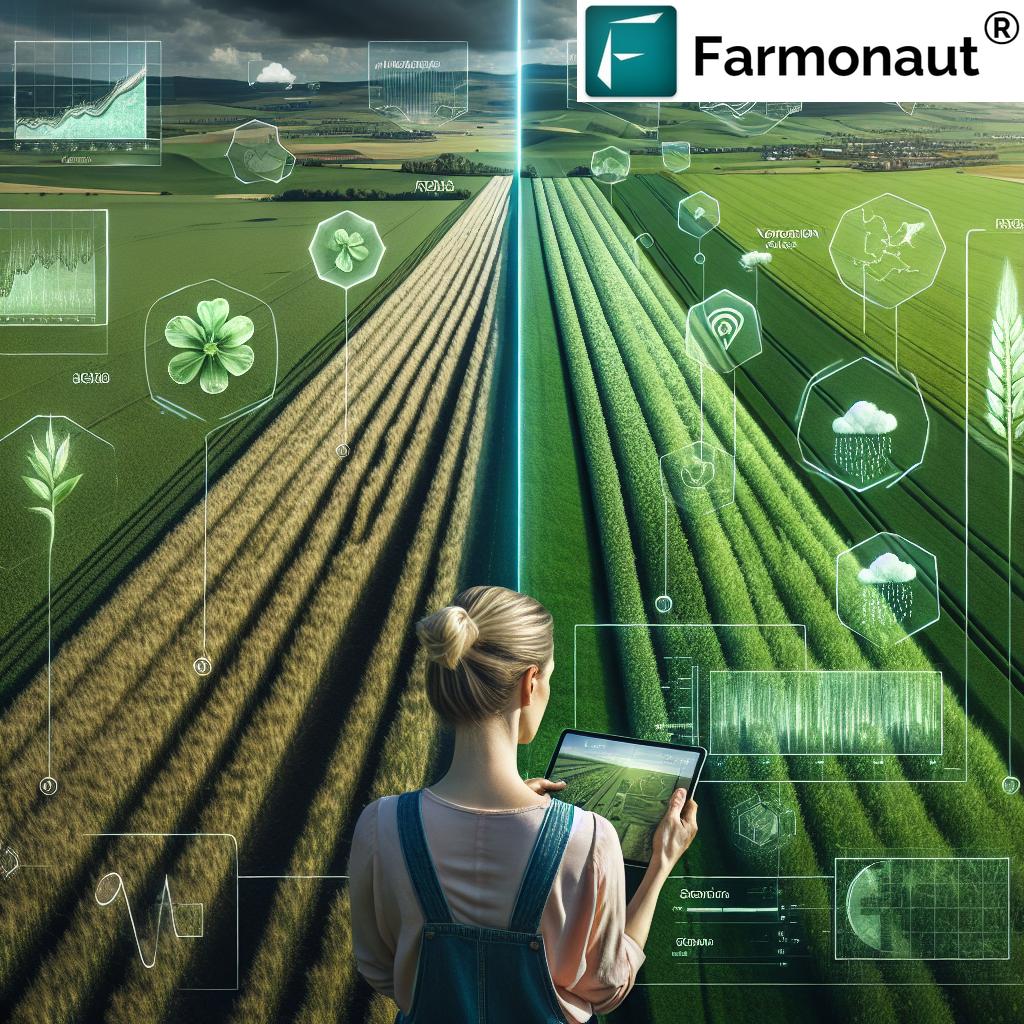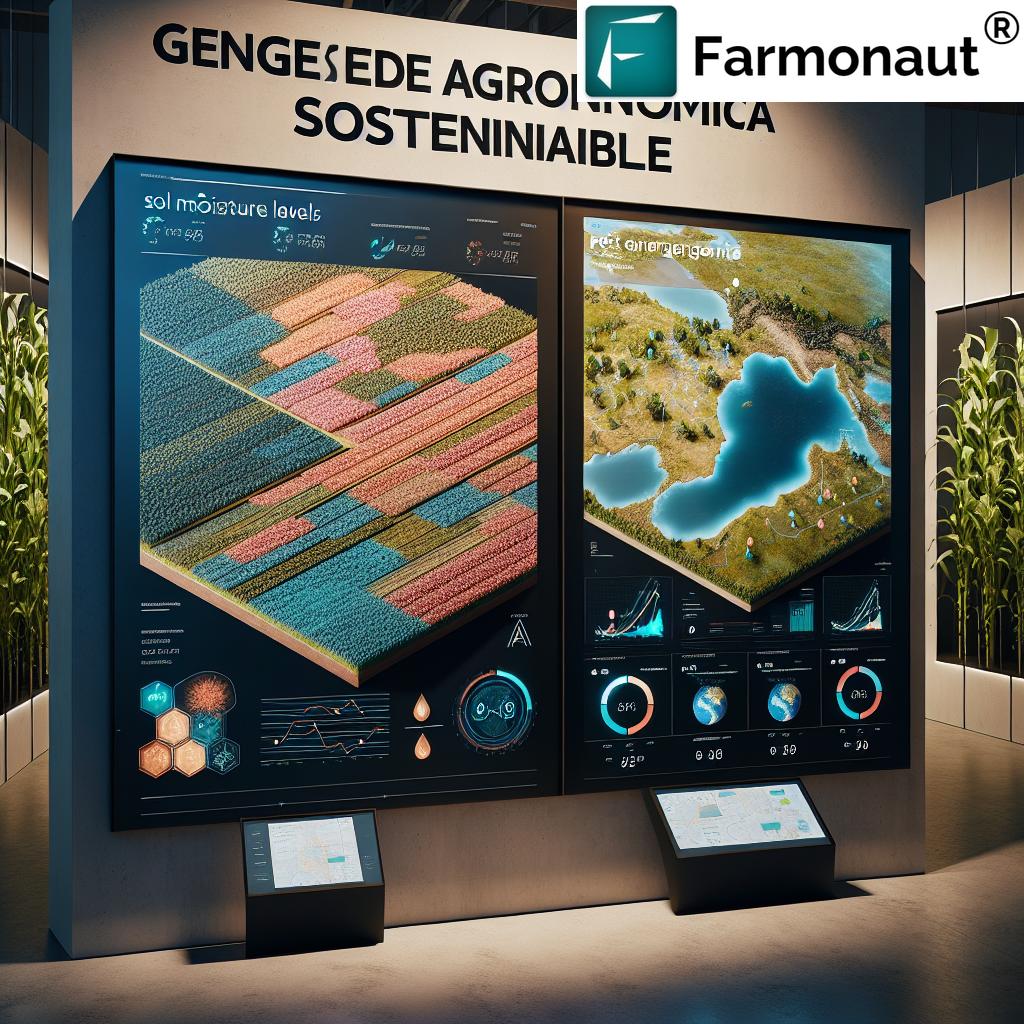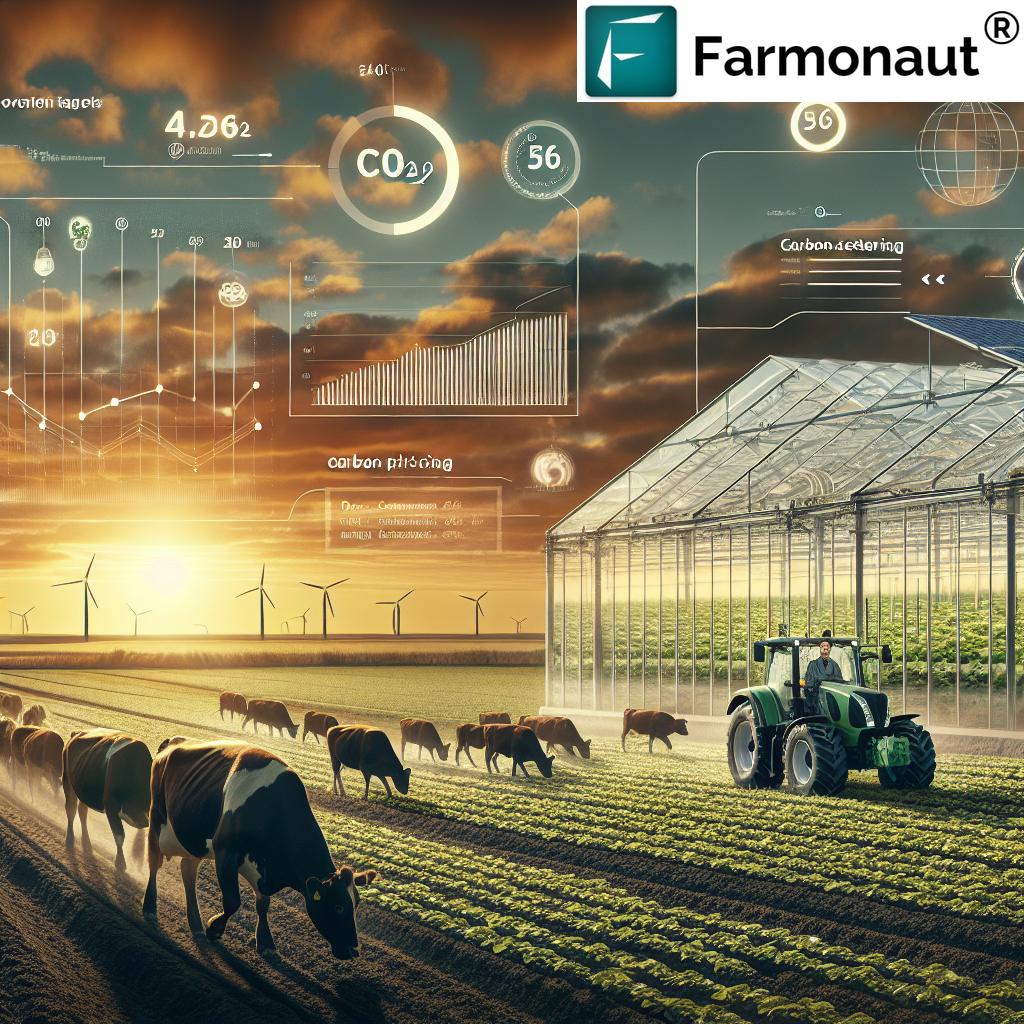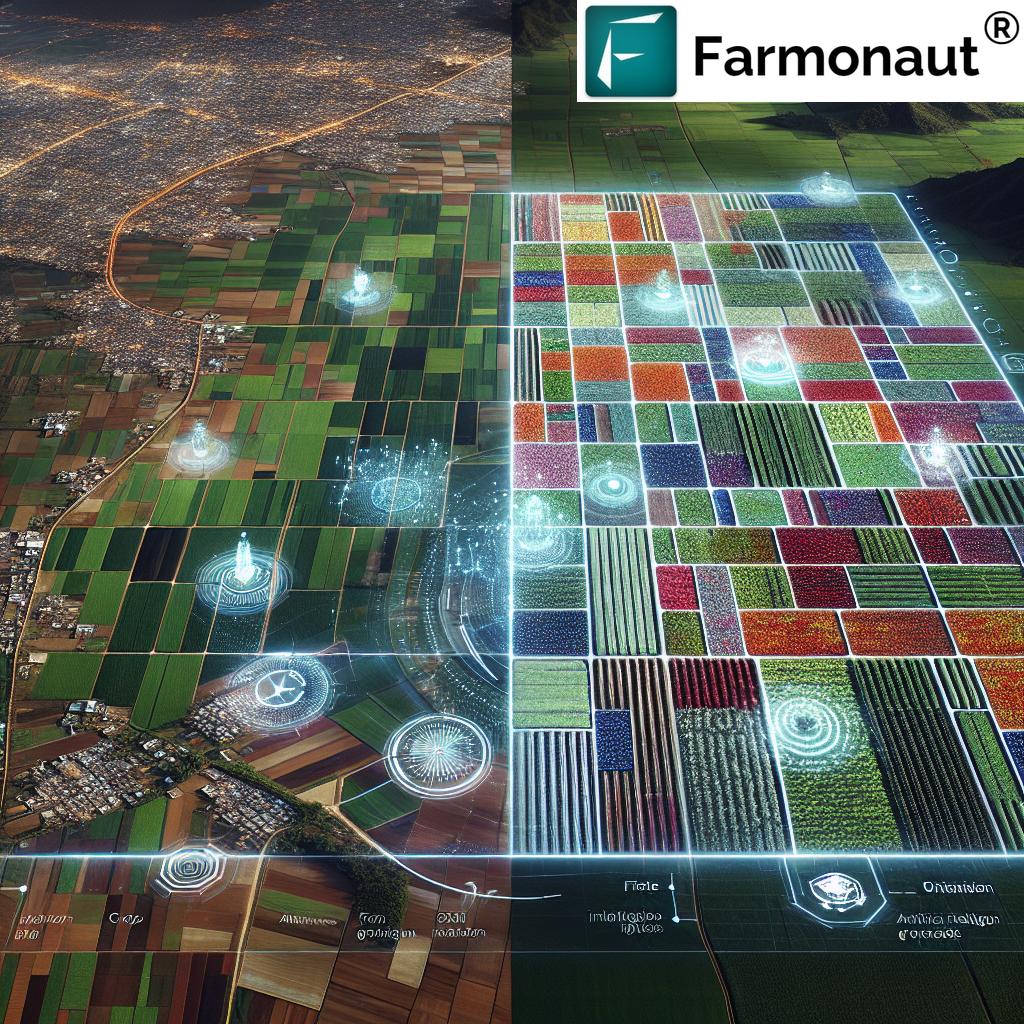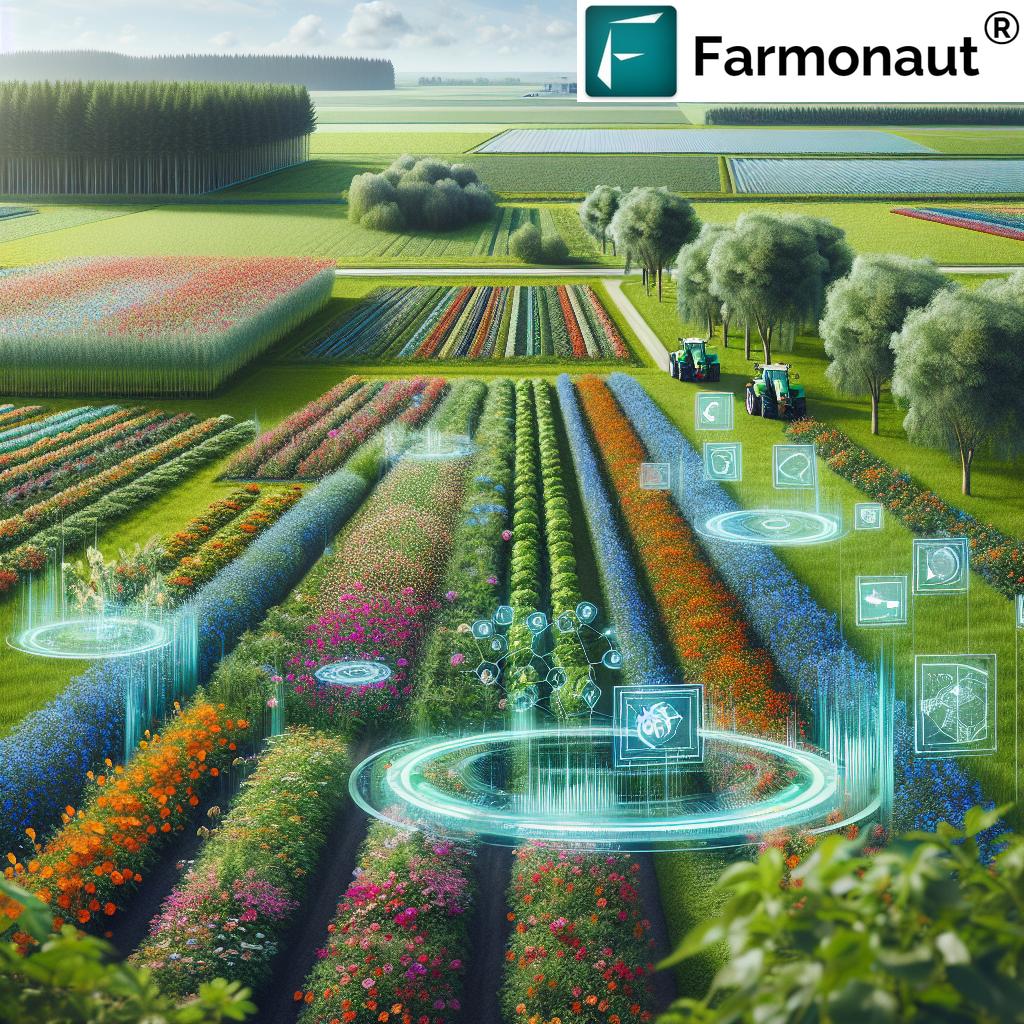German Agricultural Crisis: Navigating Financial Challenges and Policy Reform in Farming
“German farmers’ earnings have plummeted, with crop yields declining due to climate change and production costs rising by up to 40%”
As we delve into the complex landscape of German agriculture, we find ourselves at a critical juncture where financial challenges, policy reforms, and environmental pressures converge to shape the future of farming in one of Europe’s agricultural powerhouses. The German agricultural sector, long revered for its efficiency and productivity, now faces unprecedented hurdles that demand innovative solutions and adaptive strategies.
The Current State of German Agriculture: A Sector in Flux
The agricultural financial challenges facing German farmers have reached a critical point. Farm earnings trends paint a sobering picture, with the average income for the 2023/24 financial year plummeting to €77,500 – a stark 29% decrease from the previous year. This decline comes in the wake of significant farmers’ protests and has placed many farms in precarious financial positions.
Joachim Rukwied, President of the German Farmers’ Association, aptly describes the current state as a “stuttering engine,” highlighting the pervasive discontent within the industry. The reasons for this downturn are multifaceted, encompassing both economic and environmental factors:
- Rising production costs, particularly for energy, crop protection, and fertilizers
- A long-term trend of decreasing yields influenced by new pests and climate change
- Market volatility and price fluctuations
- Increasing regulatory pressures and policy uncertainties
These challenges have led to a significant crop yield decline across various products, including wheat, rapeseed, beet, and potatoes. The impact of extreme weather on agriculture has become increasingly apparent, with dry spells and unpredictable conditions wreaking havoc on harvests.

Sector-Specific Insights: A Mixed Bag of Fortunes
While the overall picture appears grim, a closer look at individual sectors reveals a nuanced landscape:
Pig Farming: A Glimmer of Hope
Contrary to the general trend, pig farming has shown resilience and profitability. With an average operating profit of €148,000, this sector stands out as a rare success story. However, farmers remain cautious about capital expenditures, particularly in building infrastructure, indicating lingering uncertainties.
Grain Production: Facing Headwinds
The grain sector continues to struggle, with prices expected to remain below last year’s levels. Coupled with an anticipated smaller harvest in 2024, grain farmers face significant challenges in maintaining profitability.
Viticulture: A Market in Crisis
German vintners are grappling with what has been termed a “market and price crisis.” The viticulture sector faces additional risks from extreme weather conditions, further complicating an already challenging trading environment.
Dairy Farming: Cautious Optimism
While dairy farms may experience a slight improvement, the outlook remains uncertain. Fluctuating milk prices and increasing production costs continue to pressure dairy farmers.
Horticulture: Adapting to Change
The horticulture sector, encompassing fruit and vegetable production, faces its own set of challenges. Climate change impacts and labor shortages are pushing horticultural businesses to explore innovative solutions and sustainable farming practices.
The Call for Agricultural Policy Reform
In light of these hardships, there is a strong call for change in agricultural policy. As Germany approaches its federal elections on February 23, the farming community is advocating for reforms that will enhance the competitiveness of German agriculture within the European market.
Key areas of focus for policy reform include:
- Stable planning frameworks and reliable regulatory environments
- Fair implementation of EU requirements without additional burdens on farmers
- Tax reforms, particularly concerning agricultural diesel
- Support for sustainable farming practices and climate-resilient agriculture
- Measures to improve market conditions and ensure fair prices for agricultural products
Rukwied emphasizes the urgent need for optimism and a correction in government strategies. The agricultural sector seeks policies that will provide a foundation for recovery and growth, addressing the shortcomings perceived under the previous government coalition.
Navigating Market Dynamics and Economic Pressures
The agricultural market dynamics in Germany are complex and often unpredictable. Farmers face challenges in translating increased production costs into higher prices for their products. Rukwied highlights the disconnection between supermarket pricing and farm-gate prices, where factors such as energy and labor costs play more significant roles in price adjustments than the prices of raw agricultural products like wheat.
To navigate these turbulent waters, farmers and agribusinesses are exploring various strategies:
- Diversification of crops and revenue streams
- Adoption of precision agriculture technology to optimize resource use
- Exploration of niche markets and value-added products
- Collaboration and cooperative approaches to strengthen market position
- Investment in climate-resilient farming techniques
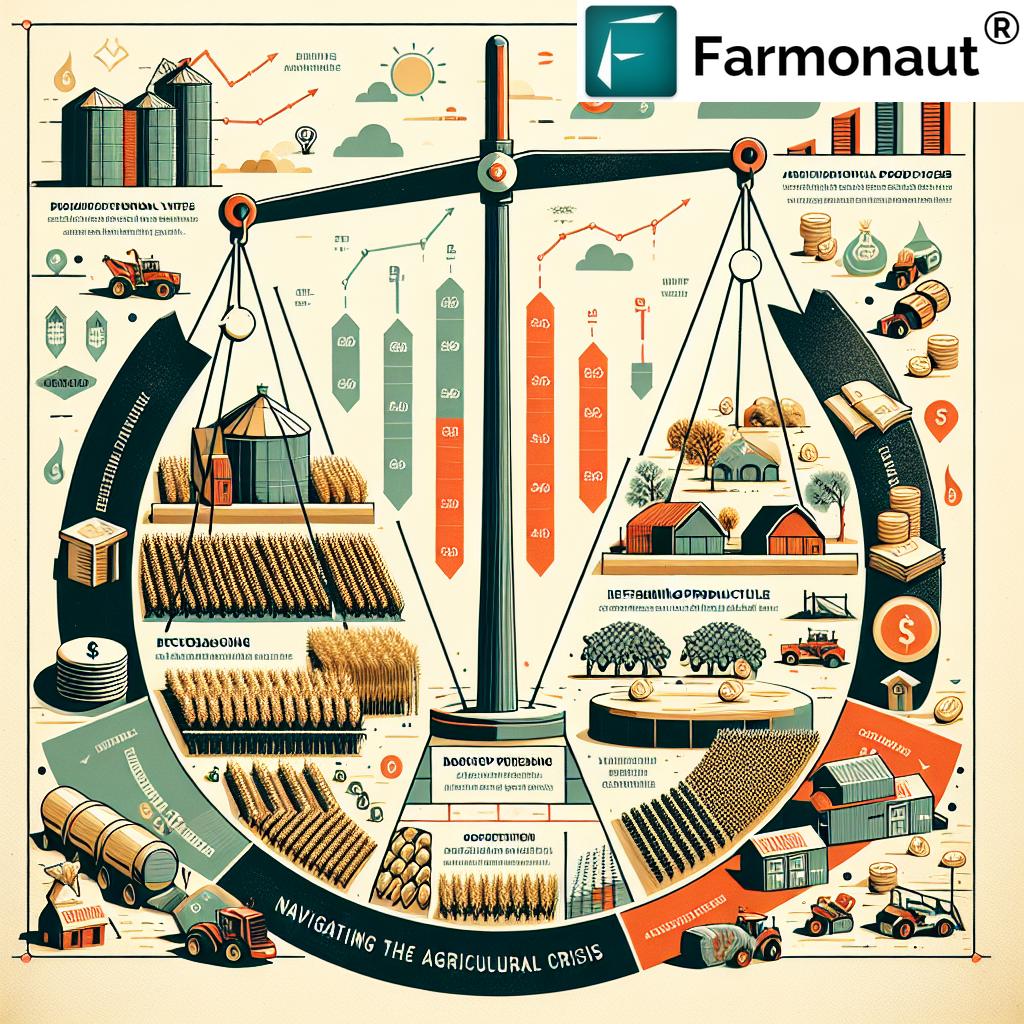
The Role of Technology in Modern Agriculture
As the German agricultural sector grapples with these challenges, technology emerges as a beacon of hope. Precision agriculture technology offers promising solutions for improved crop protection and yields. Companies like Farmonaut are at the forefront of this technological revolution, providing farmers with innovative tools to enhance their operations.
Farmonaut’s satellite-based farm management solutions offer:
- Real-time crop health monitoring
- AI-based advisory systems for informed decision-making
- Resource management tools to optimize inputs and reduce waste
- Blockchain-based traceability for enhanced supply chain transparency
These technologies are crucial in the pursuit of climate-resilient farming, allowing farmers to adapt to changing environmental conditions and optimize their resources effectively.
Sustainable Farming Practices: A Path Forward
As environmental concerns take center stage, the adoption of sustainable farming practices becomes not just an ethical choice but a necessity for long-term viability. German farmers are increasingly exploring methods that balance productivity with environmental stewardship:
- Conservation tillage to improve soil health and reduce erosion
- Integrated pest management to minimize chemical inputs
- Agroforestry and cover cropping to enhance biodiversity and soil fertility
- Precision irrigation systems to conserve water resources
- Renewable energy integration in farm operations
These practices not only address environmental concerns but also offer potential economic benefits through reduced input costs and improved resilience to climate variability.
“German pig farming remains profitable despite overall agricultural struggles, with earnings increasing by 15% in recent years.”
Farm Investment Strategies in Uncertain Times
Despite the challenging economic landscape, strategic investments remain crucial for the long-term sustainability of German farms. However, farmers are approaching capital expenditures with caution, particularly in building infrastructure. Investment strategies are focusing on:
- Technology upgrades to improve efficiency and reduce labor costs
- Diversification of farm activities to spread risk
- Energy-efficient equipment to reduce operational costs
- Land improvements for better water management and soil conservation
- Training and education to enhance farm management skills
Balancing these investments with financial prudence is key, as farmers navigate the delicate balance between modernization and financial stability.
The Impact of Climate Change on German Agriculture
The extreme weather impact on agriculture has become increasingly evident in Germany. Climate change is manifesting through:
- More frequent and severe droughts
- Unpredictable rainfall patterns
- Extended heat waves
- Increased pest and disease pressure
These climatic shifts are forcing farmers to rethink traditional practices and adopt climate-resilient farming techniques. Adaptation strategies include:
- Crop variety selection for drought and heat tolerance
- Improved water management and storage systems
- Adoption of protected cultivation methods
- Integration of weather forecasting and early warning systems
The transition to climate-resilient agriculture is not just about survival; it’s about creating a more sustainable and profitable future for German farming.
The Role of Government and Industry Collaboration
Addressing the multifaceted challenges facing German agriculture requires a collaborative approach involving government, industry, and research institutions. Key areas for collaboration include:
- Research and development of climate-resilient crop varieties
- Investment in rural infrastructure and digital connectivity
- Development of risk management tools and insurance products
- Support for young farmers and agricultural education
- Promotion of German agricultural products in international markets
By fostering partnerships and dialogue between stakeholders, Germany can work towards a more robust and adaptive agricultural sector.
The Future of German Agriculture: Challenges and Opportunities
As we look to the future, the German agricultural sector stands at a crossroads. The challenges are significant, but so are the opportunities for innovation and growth. Key trends shaping the future include:
- Increasing adoption of digital farming technologies
- Growing consumer demand for sustainable and locally produced food
- Emergence of new markets for bio-based products and renewable energy
- Shift towards more diverse and resilient farming systems
- Integration of agriculture with environmental conservation efforts
By embracing these trends and continuing to adapt, German agriculture can emerge stronger and more resilient from its current challenges.
German Agricultural Sector Financial Overview
| Agricultural Sector | Estimated Annual Revenue (€ million) | Profit/Loss Trend | Key Challenges | Adaptation Strategies |
|---|---|---|---|---|
| Pig Farming | 8,000 | ↑ | Market volatility, regulatory pressures | Modernization of facilities, biosecurity measures |
| Grain Production | 12,000 | ↓ | Climate change impacts, price fluctuations | Precision agriculture adoption, crop diversification |
| Viticulture | 1,500 | ↓ | Market crisis, extreme weather events | Quality focus, wine tourism development |
| Dairy Farming | 10,000 | ↔ | Price volatility, sustainability demands | Herd management technology, value-added products |
| Horticulture | 5,000 | ↓ | Labor shortages, climate variability | Automation, protected cultivation systems |
Leveraging Technology for Agricultural Advancement
In the face of these challenges, technological solutions offer a pathway to increased efficiency and sustainability. Farmonaut’s satellite-based farm management solutions are at the forefront of this technological revolution in agriculture. By providing real-time crop health monitoring, AI-driven advisory systems, and resource management tools, Farmonaut empowers farmers to make data-driven decisions that can significantly improve their operations.
Key benefits of adopting precision agriculture technology include:
- Optimized resource use, leading to cost savings and reduced environmental impact
- Early detection of crop stress and disease, allowing for timely interventions
- Improved yield forecasting and harvest planning
- Enhanced traceability and quality assurance in the supply chain
Farmers interested in exploring these technologies can access Farmonaut’s services through various platforms:



For developers and businesses looking to integrate Farmonaut’s satellite and weather data into their own systems, the API offers flexible solutions. Detailed information can be found in the API Developer Docs.
Conclusion: A Path Forward for German Agriculture
The German agricultural sector is facing unprecedented challenges, but with these challenges come opportunities for innovation and growth. By embracing sustainable farming practices, leveraging cutting-edge technology, and advocating for supportive policies, German farmers can navigate the current crisis and build a more resilient and profitable future.
Key takeaways for the path forward include:
- Embracing precision agriculture and digital farming technologies
- Investing in climate-resilient farming practices
- Diversifying revenue streams and exploring niche markets
- Collaborating with research institutions and technology providers
- Engaging in policy discussions to shape a supportive regulatory environment
As we move forward, the resilience and adaptability of German farmers will be crucial in overcoming the current challenges and seizing future opportunities. With the right blend of innovation, policy support, and sustainable practices, German agriculture can emerge stronger and more competitive on the global stage.
FAQ Section
Q: What are the main challenges facing German farmers today?
A: German farmers are grappling with declining crop yields due to climate change, rising production costs, market volatility, and increasing regulatory pressures.
Q: How has climate change impacted German agriculture?
A: Climate change has led to more frequent extreme weather events, such as droughts and heat waves, resulting in crop losses and increased uncertainty in production planning.
Q: What role does technology play in addressing agricultural challenges?
A: Technology, particularly precision agriculture solutions like those offered by Farmonaut, helps farmers optimize resource use, monitor crop health in real-time, and make data-driven decisions to improve yields and reduce costs.
Q: How can German agriculture become more sustainable?
A: Adopting sustainable farming practices such as conservation tillage, integrated pest management, and precision irrigation can help balance productivity with environmental stewardship.
Q: What policy changes are German farmers calling for?
A: Farmers are advocating for stable planning frameworks, fair implementation of EU requirements, tax reforms, and support for sustainable farming practices to enhance their competitiveness in the European market.


